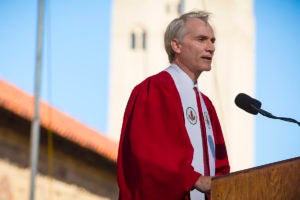Do your part to foster belonging, president urges new students
At the 127th Opening Convocation Ceremony held on Tuesday, Sept. 19, in the Main Quadrangle, Stanford President Marc Tessier-Lavigne urged new students to commit themselves to the university’s values of diversity, inclusion and free expression, and to do their part to make Stanford a community that fosters belonging for all its members.
“Throughout the university, we know that our strength comes from the diversity of our community, and our culture of inclusion of people of all backgrounds, nationalities, races, genders, identities, religions, political views and ways of thinking,” Tessier-Lavigne said.
“A thriving academic community depends on the free and open exchange of ideas in a culture of mutual respect, even – and especially – if the ideas and perspectives of others don’t square with our own. We learn by being exposed to new perspectives, by having our ideas challenged, by being forced to sharpen our arguments.”
He said it was essential that everyone in the Stanford community rededicate themselves to its foundational values, “especially after a summer in which we witnessed violent displays of intolerance, bigotry and hatred in our country and throughout the world.”
Tessier-Lavigne said the foremost message he wanted to convey to students was that they belong at Stanford, whether they were the first person in their family to go to college or one of many family members to pursue a college education.
“Whether you were born in the United States, or in another special place somewhere around the world,” he continued. “Whether you are strongly committed to an identity, a group, a faith, a talent, an activity, a political party, a life philosophy – something important, something near and dear to you – or whether you are still figuring out a lot of those things, I want all of you to know: you belong here. This includes our students enrolled in the DACA program, who are with us today. We want you to know that we will continue to push for a legislative solution to protect you and all our country’s DREAMers. You belong here and we stand by you.”
Tessier-Lavigne was one of several speakers who welcomed new students and their families and friends to Stanford during Convocation, which inaugurates the new academic year. The ceremony also featured Alexis Kallen, a senior majoring in political science and in feminist, gender and sexuality studies; Richard H. Shaw, dean of admission and financial aid; and Harry J. Elam Jr., vice provost for undergraduate education.
Looking back at her arrival at Stanford three years ago, student Alexis Kallen said she had feared that she would be “seen as lesser,” due to her speech and movement limitations, her family situation – her father was homeless – and her financial limitations.
“However, my fears quickly subsided,” she said. “The awkward dining hall conversations during New Student Orientation turned into late night talks sitting around in dorm hallways surrounded by buckets of mozzarella sticks. Wherever I turned, people were eager to talk about solving some of the world’s deepest issues, as well as those who wanted to talk about the latest episode of Gossip Girl.”
Kallen said she soon learned that Stanford’s tight-knit community included members of the faculty as well.
“During my first few days, I met Dr. Luci Herman, a law school lecturer who doubled as my resident fellow,” she said. “Our casual conversations in the lounge quickly transformed into lengthy talks on foreign policy and women’s rights. As I dove into my academic journey she guided my studies, advised me on my on-campus pursuits, and eventually Skyped me daily when I pursued independent research in Rwanda – even though she would never approve of me riding on the back of motor scooters to get around Kigali – no matter how many helmets I wore.”
Kallen said her once tearful calls home to her father quickly faded into exciting conversations about the new ideas and relationships she had built through one-on-one discussions with faculty and friends.
“No matter where you come from, Stanford is made for you,” Kallen said. “You will find a community here each step of the way to support and teach you. There were times at Stanford when I felt challenged, yet it is in those moments that I learned to lean on the many communities and individual relationships that I have formed here. Stanford has allowed me to empower myself and raise my voice in ways that I never thought possible and I know it will do the same for all of you.”
Read the entire story on the Stanford News pages.

